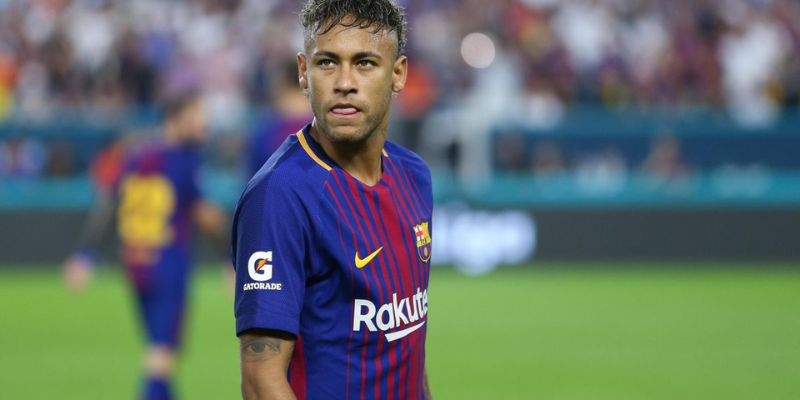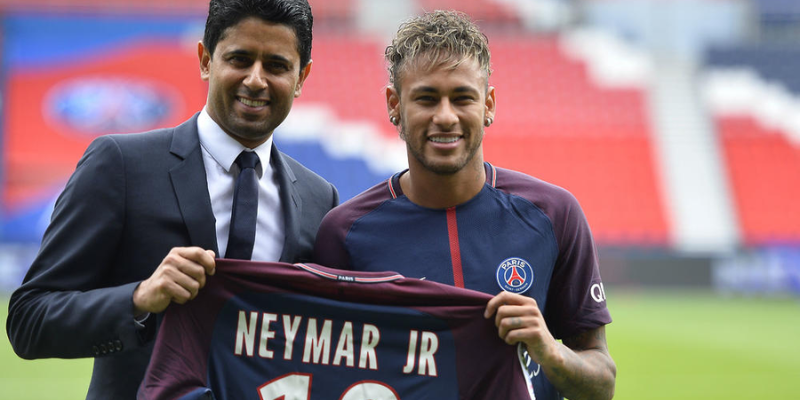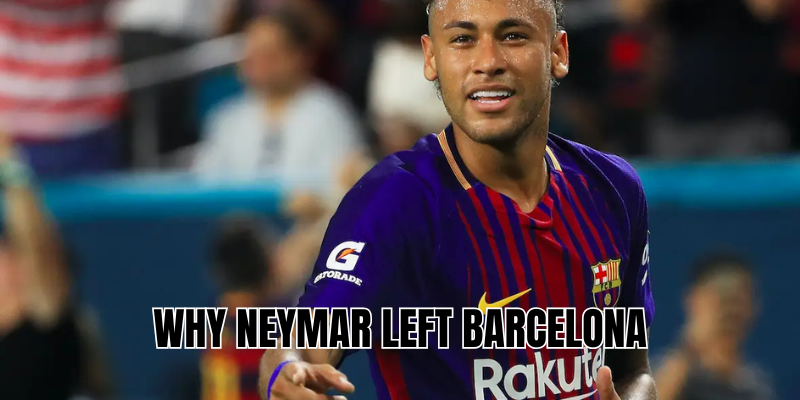why neymar left barcelona reasons 2025 interview# Why Neymar Left Barcelona
In the world of football, few exits have sparked as much intrigue, debate, and speculation as that of Neymar departing, why Neymar left Barcelona — was it ambition, money, personal challenges, or conflicts behind the scenes? In this article, QuraGoal takes you through the tangled web of reasons, insider accounts, and recent revelations to unpack the truth behind Neymar’s dramatic departure.
The brilliance and pressure of the MSN era

When Neymar joined Barcelona, he became part of an attacking trinity that enchanted the footballing world: Messi, Suárez, Neymar. Together, “MSN” helped the club win La Liga titles, the Champions League in 2015, and numerous domestic honors. Over four seasons, Neymar elevated his game, took on big moments, and became one of the most feared forwards in Europe.
But even amid success, cracks began to show beneath the glamour. Neymar was often viewed as a talented third wheel behind Messi. In Barcelona’s hierarchy, Messi was the undisputed star, the fulcrum of attacks and the face of the club. That dynamic inevitably caused tension in terms of recognition, individual identity, and long-term legacy.
The MSN era was spectacular — but it also set the stage for Neymar’s growing desire for his own platform, less overshadowed and more autonomous.
The popular narratives: money, ambition, and legacy
Over the years, multiple theories have circulated about Neymar’s Barcelona exit. Below are the most persistent ones, many of which hold partial truths, but none capture the whole picture:
Financial incentive
No surprise here — PSG triggered Neymar’s astronomical €222 million release clause, making him the most expensive transfer in history at the time. The contract in Paris offered superior wages, bonuses, and commercial leverage. Many believed Neymar saw this as a chance to finally be financially rewarded at his full worth.
Desire to escape Messi’s shadow
A frequent narrative: Neymar wanted to be the main man. Staying at Barcelona meant always being compared to Messi, certainly second fiddle in many eyes. The argument goes that by moving to PSG, he could claim a fresh identity, leadership, and possibly vie for the Ballon d’Or more clearly.
A new sporting challenge
Some believed Neymar craved a fresh adventure — not just in terms of a club, but in responsibility, expectations, and the pressure to lift a team by himself. PSG’s project, with Qatar-backed ambition, seemed poised to dethrone Europe’s elite. Neymar may have viewed the move as a way to push his own limits.
Playing with fellow Brazilians and personal factors
A more recent and revealing dimension is Neymar’s own explanation: playing alongside compatriots in Paris — Thiago Silva, Dani Alves, Marquinhos, Lucas Moura — appealed to him on a human level. He said his move wasn’t about dethroning Messi or chasing the Ballon d’Or at all, but something personal. In his words: “It’s something personal.” He also admitted the PSG deal was financially better than what he had at Barcelona.
These narratives intertwine performance, ego, emotion, and pragmatism. But until recently, they remained speculative until Neymar addressed some of them directly.
Neymar’s own account: revelations from the Romário podcast

In 2025, in a candid conversation with Brazilian legend Romário, Neymar addressed head-on the enduring question: why I left Barça. His reflections cast new light, clearly refuting several myths and emphasizing internal motives:
- Neymar insisted he did not depart because he wanted to become the best player in the world at PSG. When Messi asked him why he was leaving — “do you want to be the best in the world?” — Neymar replied, “I told him no.”
- He clarified that financial benefits did play a role, but they were not the sole motivator.
- Importantly, Neymar revealed that playing with fellow Brazilians was a meaningful pull: “There were Brazilians there too … I wanted to play with the Brazilians.”
- He framed the decision as deeply personal: he didn’t assert that he was growing frustrated with Messi or the club hierarchy — but rather that he felt he needed something new for himself.
This fresh account forces us to reconsider earlier assumptions and recognize that Neymar’s mindset at the time was more nuanced than the caricatures painted by media or rumors.
Internal conflicts, club politics, and off-field turbulence
Beyond public narratives and Neymar’s own testimony, other underlying tensions likely contributed to the exit:
- Tension with Barca’s board and sporting policy
- Reports suggested Neymar had disagreements with Barcelona’s management and dissatisfaction with how the club was heading. Some felt he wasn’t valued enough or trusted with more control.
- Tax, legal, and “Neymargate” shadows
- Barcelona’s acquisition of Neymar from Santos was itself embroiled in controversy (dubbed “Neymargate”). Discrepancies in reported vs. actual fees, payments to his father, and complex accounting drew legal scrutiny and penalties. While not directly a cause of departure, this opaque financial background may have contributed to frustration and mistrust.
- Moments of disillusionment on the pitch
- Anecdotes point to specific moments that stung. For example, Neymar left his final Camp Nou match reportedly with tears, and some agents later claimed that matches like Barça’s humiliating 6–1 defeat turned him off. Whether symbolic or real, such episodes can chip away at sentimental bonds.
- Pressure and injury risk
- Neymar had already suffered injury setbacks in his career by 2017. The constant physical strain, expectations.
Breaking down the motives: a layered explanation

To truly answer why Neymar left Barcelona, we must view his move as the result of multiple converging motives rather than a single cause. Let’s lay them out:
| Motive | Evidence & weight | Role in decision |
| Financial gain | PSG contract and release clause were massive upgrades | Important, but not exclusive |
| Identity & legacy | Neymar explicitly denied wanting Messi’s throne, but still desired personal breathing space | Medium-high |
| Playing with Brazilians / personal joy | Neymar’s own words put weight on this emotional pull | High |
| Frustration with club hierarchy | Various rumors of tension with Barça leadership | Supporting |
| Need for new challenge | PSG’s ambition and Neymar’s drive | Significant |
| Physical/mental fatigue | Injuries and the grind of top-level pressure | Background factor |
No single line defines his departure — rather, Neymar’s decision was an aggregate of emotional, professional, and personal needs culminating in a bold leap.
The immediate aftermath and legacy at Barça
As soon as the release clause was triggered and the move confirmed, the reaction in Barcelona was visceral. Many fans felt betrayed. Some burned his jerseys. Barcelona’s president admitted that they couldn’t stop him. Neymar’s shift signaled not just a high-profile exit, but the end of the MSN era.
On the pitch, Neymar’s absence altered dynamics. Barcelona’s attacking balance shifted more heavily toward Messi. Replacements like Coutinho and Dembélé failed to replicate the same blend of flair, chemistry, and productivity. Over subsequent seasons, Barca experienced stinging European exits and inconsistencies in rebuilding their attacking identity., Neymar left with remarkable numbers — goals, assists, trophies — yet his decision launched a career arc defined by both brilliance and controversy.
What this move meant for Neymar’s career and perception
Neymar’s departure.
Public perception has oscillated: some see him as a mercenary chasing money, others defend him as an artist seeking autonomy. The new revelations make it harder to reduce his move to a trope — he was neither purely ambition-driven nor entirely emotional. He acted with both head and heart.
His legacy at Barcelona is bittersweet: adored in moments, criticized in departure — but undeniably transformative in spirit, performance, and the grand footballing story.
Conclusion
Why Neymar left Barcelona cannot be answered with a single line — it was both a personal and strategic turning point. He didn’t leave simply to outshine Messi, but rather sought a new chapter for himself: better financial terms, a connection to Brazilian teammates, a path for personal growth, and a chance to redefine his own legacy. Today, his exit remains one of football’s most dissected moments — and now, thanks to Neymar’s own words and careful analysis, we get closer than ever to the truth.
If you enjoyed this deep dive, feel free to explore our articles on Neymar’s Barcelona career, PSG contributions, or top shocking transfers in football history. Let us know your thoughts — why do you think Neymar left Barcelona? Follow QuraGoal to see more interesting information.




